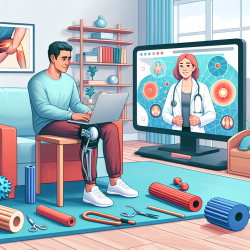Exploring the Impact of Internet-Mediated Physiotherapy and Pain Coping Skills Training
The realm of healthcare is continuously evolving, and with the advent of technology, innovative solutions are emerging to address persistent health issues. One such solution is Internet-mediated physiotherapy and pain coping skills training, as explored in the research article titled "Internet-mediated physiotherapy and pain coping skills training for people with persistent knee pain (IMPACT – knee pain): a randomized controlled trial protocol." This study presents a groundbreaking approach to managing knee pain, particularly in individuals over the age of 50 who suffer from osteoarthritis (OA).
The Study at a Glance
The study recruited 148 participants over 50 years old with self-reported persistent knee pain consistent with knee OA. Participants were randomly assigned to either an online educational control group or an intervention group that received a combination of pain coping skills training (PCST) and physiotherapist-guided exercise delivered over the Internet. The primary outcomes measured were average knee pain on walking and self-reported physical function, assessed at baseline, 3 months, and 9 months.
Key Findings and Implications
The study's primary objective was to determine if the Internet-based intervention (PCST + Ex) was more effective than online educational material alone. The results indicated that participants in the PCST + Ex group experienced greater reductions in pain and improvements in physical function compared to the control group. This suggests that combining PCST with physiotherapy exercises delivered online can significantly enhance outcomes for individuals with persistent knee pain.
These findings are particularly relevant for practitioners seeking to improve their skills and outcomes for patients with knee OA. By integrating Internet-mediated interventions into their practice, healthcare providers can offer accessible and effective treatment options, especially for patients in remote or underserved areas.
Encouraging Further Research and Implementation
While this study provides valuable insights, it also opens the door for further research and exploration. Practitioners are encouraged to delve deeper into the potential of Internet-based interventions and consider how these approaches can be tailored to meet the unique needs of their patients.
Moreover, as technology continues to advance, the integration of online therapy services, such as those provided by TinyEYE, can play a crucial role in expanding access to quality healthcare. By leveraging the power of the Internet, practitioners can reach a broader audience and deliver personalized care that addresses both the physical and psychological aspects of chronic pain management.
To read the original research paper, please follow this link: Internet-mediated physiotherapy and pain coping skills training for people with persistent knee pain (IMPACT – knee pain): a randomized controlled trial protocol.










